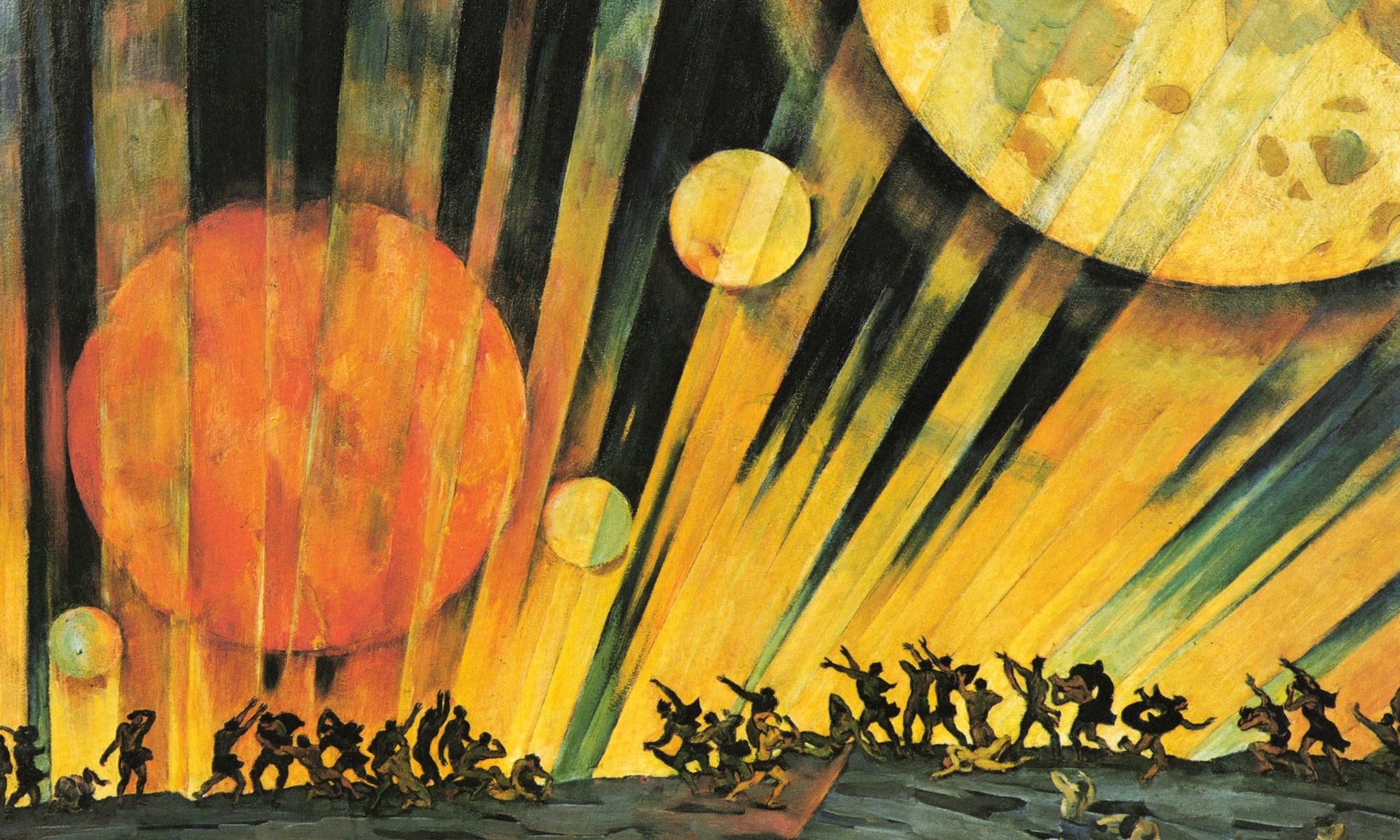For the revolution to win, it must feed the people. Gringo Campesino argues for a vision of what this may look like. We publish not as a blanket promotion of this vision but to spark a greater discussion/debate on the role of agriculture in a communist revolution.

Staring at a re-greened Mars from the weary eyes of the working class is an outright fantasy. Forested with a speckling of towns, farms, places of craft, commerce, and play, you have to squint to see it through the fog. The vacuum of space between here and there seems too far to overtake. Still, there is reason to shoot for the stars. There is no NASA nor Muskian path to survival of humans on the Earth after ecological collapse. At least there is not one worth taking. Beneath the layers of detritus atop the forest floor, there lies the soil that bears the fruit of Full Communism. The only choice is to slow the approach of collapse while building socialism on Earth. The goal is to develop not a collapse oriented ideology of “disaster communism”, but to formulate a scientific approach to combating the woes of failing ecosystems and rotten economics. The final stop is a star called Communism. A concrete study of agriculture informs us to dig in before we reach for it.
The answers were beneath our feet, even before the planet was enveloped in the ever-warming blanket which Capitalism requested on its deathbed. Cycles other than its own become interrupted. Existing in a purely extractive relation to nature leads to death, and even some parasites can recognize when their survival depends on saying enough is enough. With the aid of the death program that is capitalism, humans have far surpassed the simple gut parasite and have achieved even greater strides in death than the likes of the Naegleria fowleri, or the Brain-Eating Amoeba. These creatures rise in numbers with the rising temps and tides. If working people are to see that Red Planet, Naegleria fowleri is going to have to eat the brains of the rich. There is too much work to be done – reforesting the Amazon, Sub-Saharan Africa, Southeast Asia, and the Southern US; replenishing the grasslands, and bolstering the wetlands. No time for swimming about in the hot, methane burping pools from which the capitalists summoned their demons. A better bet is to swim in passages of Masanobu Fukuoka, whose work on regreening deserts and natural farming informs a socialist project in defense of the living. A focused perspective from the lens of the indigenous farmer and those in tune with regional biomes will be critical if we are to achieve our lofty goals in the night sky.
The business of growing food and medicine for the working class becomes nearly impossible under quickly changing and worsening conditions, but it is most certainly impossible under the mechanics of capitalism. As nature trends toward diversification and adaptation, Capitalism tends toward monopolization and accumulation. The farmer under capitalism is irrevocably trapped by this dichotomy, a hellish and living dialectic. The need for sustenance never ceases but the growing conditions continue to sharply narrow the yield. The farmer can only be liberated by the participation of the working class, guided by the communist project. Free of the limits of capital, farm workers across the globe can participate in the defense of the Earth and its living through regenerative agriculture, growing food while putting carbon back into the soil. The science already has shown its results, now the land and the worker must be liberated to unlock the potential that our soil brings to our mutual defense. A deep historical look agrarian socialism in the US is in order. The Sharecroppers Union and Oklahoma Communists know where the pitfalls lie.
A food system for socialism and survival is yarrow for our wounds. Natural farming can and will provide equal to higher yields than the exploitative and extractive harvests of Industrial agriculture under the supervision of monopoly control. There is no way for a large agricultural corporation to diversify its products and methods to the degree required by climate catastrophe. There is little profit in such research or strategies. Much of modern crop technology will become futile when faced with rapid and widespread changing of conditions. Farmers today are seeing wild swings within the span of a single season. A centralized private interest cannot understand the needs and whims of an ecosystem in real time, including and perhaps most egregiously, those of working people. Such a dire situation calls for a diversity of seed genetics in the hands of diverse growers using diverse methods, all while rooted firmly in the local habitat.
A socialist project encourages such a horizontal network of support and resources, so long as it actively supports each regional biome with its own specific project geared toward adaptation and survival. A centralized hub of resources and research also proves integral, so that all of the localized work can be put into a context and coordination that is international, as both climate change and class are globally shared struggles. In the heart of Jackson, Mississippi, a group of comrades called Cooperation Jackson created a microcosm of this network for their own survival in the face of their racist and exploitative enemies. We still have much to learn from their continued project, and in the meantime, it is best used as a concrete jumping off point so that we can begin to observe our options for a life worth living in the future. As does Cooperation Jackson, a revolutionary food system needs to apply both modern scientific knowledge and practical ancestral wisdom to provide nutrition and livelihoods. A network of cooperatives is not revolutionary in itself, but it does offer a path forward towards a more just food system, positioned to smooth over revolutionary change with minimal interruption to food security. The model is certainly better equipped to defend against climate disaster that is capitalism.
Developments in technology are hugely important, but they must be accessible and openly sourced so that the horizontal network of growers and researchers can pull from it and apply it in their fields. We must not rely strictly on technology for adaptation on the farm. We must also encourage natural cycles to allow for mutation and diversity. The potential confluence of plant-based medicine and modern lab technology may focus on the microscopic, but it also serves as a form of telescope so that the farm in the stars seems ever closer. The scientific method must be applied alongside concepts of ecology and ancestral knowledge. Web-based technology will prove critical towards distributing food in a way that meets the needs of all people, while also tracking the ecological impacts of our food use. The logistics of connecting a network of many smaller growers with end users will be regional and web-based, minimizing gaps in need. In this example, it is clear why a higher number of smaller farms are necessary for such a food system to exist. If one farm that is grown on clay is hit hard by a particularly unrelenting wet season, another farm down the road on sandy soil can better survive and drain away the effects of the season. We need a diversity of tactics in the field after all. May monocropping burn in hell.
The necessary diversification of seed genomes and the agricultural methodology envisioned is impossible under capitalism. This remains the case even if capitalism is removed from the equation, so long as socialism firmly rooted in community building is not its replacement. Further, a revolutionary food system requires a broader revolution of society at large, conducted by the working class and its organizations. it’d implementation relies on socialized medicine, housing, and life. It almost seems too obvious. How can we possibly patch up our planet enough to survive our escape if we cannot even take care of each other as humans? We must see ourselves as part of the whole, while also as uniquely important. Practicing communism of the hoe provides us with the strength and sustenance we need when reaching towards revolutionary skies. We have to transform this Earth and our relations upon it so that working people, not the filthy rich and fascist scum, may one-day plant turnip seeds on Mars.
References
Akuno, Kali & Nagwaya, Ajamu. Jackson Rising: The Struggle for Economic Democracy and Black Self-Determination in Jackson, Mississippi. 2017.
Bisset, Jim Agrarian Socialism in America: Marx, Jefferson, and Jesus in the Oklahoma Countryside, 1904-1920. 1999.
Fukuoka, Masanobu. The One-straw Revolution: An Introduction to Natural Farming. 1978.
Fukuoka, Masanobu. Sowing Seeds in the Desert: Natural Farming, Global Restoration, and Ultimate Food Security. Chelsea Green Publishing, 2013.
Farmers Encouraged to ‘Champion Soil’ in Face of Climate Change:
https://www.publicnewsservice.org/2018-12-28/sustainable-agriculture/farmers-encouraged-to-champion-soil-in-face-of-climate-change/a65059-1
Pilot program encourages farmers to adopt carbon-conscious growing styles:
https://www.heraldandnews.com/news/local_news/business/pilot-program-encourages-farmers-to-adopt-carbon-conscious-growing-styles/article_04b7ab0d-00b7-589e-80c4-ee28af24e877.html



